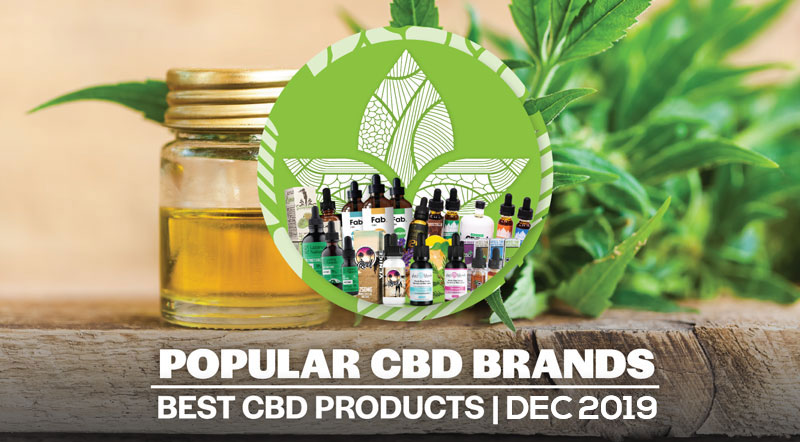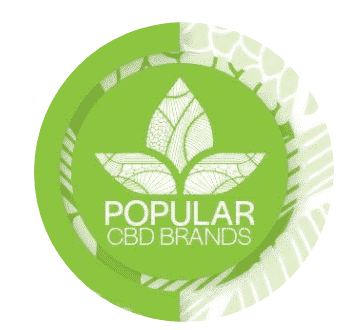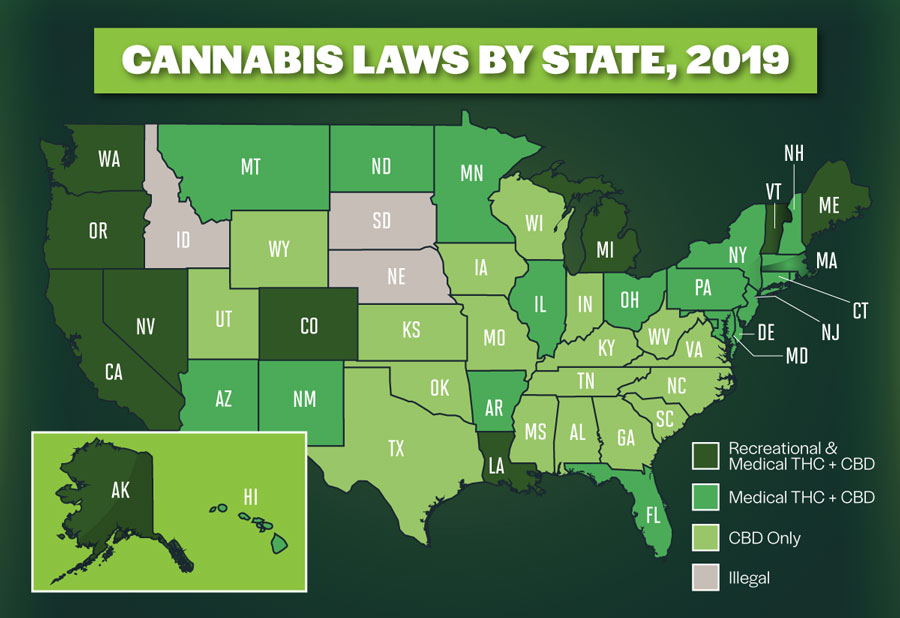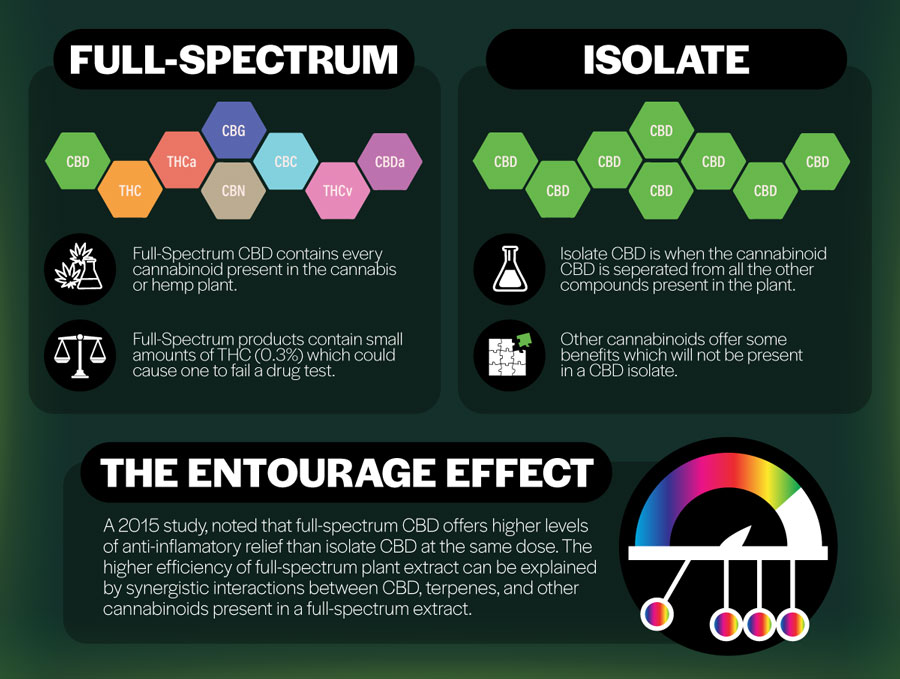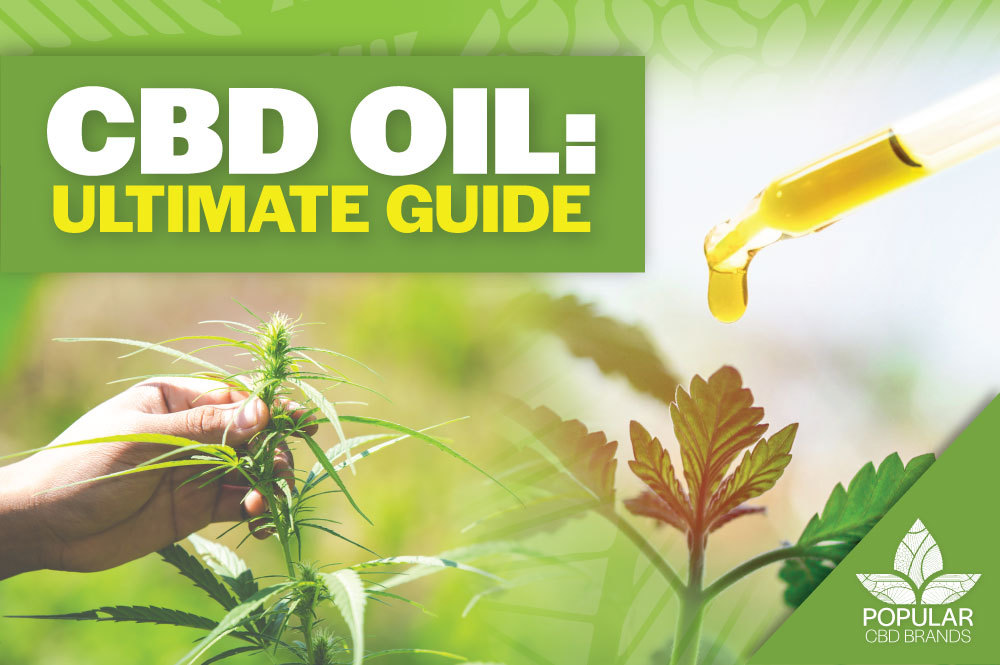
Welcome to the most complete guide to cannabidiol (CBD) oil anywhere on the Internet. You’ve tried to find reliable information about CBD online, and your search hasn’t accomplished anything other than leaving you feeling more confused and overwhelmed than ever.
It’s difficult to cut through the marketing hype and get to the truth about CBD oil when you can find someone, somewhere, willing to claim that CBD fixes just about every human condition you can imagine. That’s why this guide exists.
We’re going to start at the beginning and provide absolutely all of the information that you need in order to make an informed decision about the pros and cons of CBD oil. When you’re done reading, you’ll be one step further along the road to becoming a full-fledged CBD expert.
What Is CBD?
Cannabidiol (CBD) is one of the 113 known cannabinoids found within the cannabis plant. CBD is one of the major components of any full-spectrum extract of cannabis. It interacts with the body’s endocannabinoid system when it enters the bloodstream via the lungs, the digestive system or another route.
Over the past several years, researchers have committed immense resources toward researching the potential benefits that CBD may hold for human health. Many clinical studies of CBD have produced extremely promising results. The research has already culminated in the creation of one prescription drug – Epidiolex – which has received FDA approval as a treatment for certain rare seizure disorders.
Isn’t Cannabis the Same Thing as Marijuana?
Cannabis is a plant that responds to selective breeding by exhibiting a wide variety of potential chemical profiles. If you’ve ever been to a marijuana dispensary, you’ve seen a seemingly endless selection of medical cannabis with names ranging from Birthday Cake to Blueberry Kush. Each flower looks a little different from the rest, and each one acts on the body in a slightly different way – but each one comes from the same plant. Industrial hemp – the source of CBD oil – is just another variety of the cannabis plant.
Industrial hemp is one of the world’s most useful plants. It’s used to produce fabric, biofuel, building materials, paper, food and more. Psychoactive tetrahydrocannabinol (THC) – the cannabinoid that makes you feel high – has been bred almost completely out of it. Thanks to laws such as the Hemp Farming Act of 2018, the U.S. federal government no longer treats industrial hemp the same as marijuana. It’s easier than ever for domestic farmers to obtain the necessary permits to grow hemp.
Producers derive CBD oil from industrial hemp that contains less than 0.3 percent THC by weight. No matter how much CBD oil you consume, you will not feel high. It is even possible to buy completely THC-free CBD oil made from purified CBD isolate.
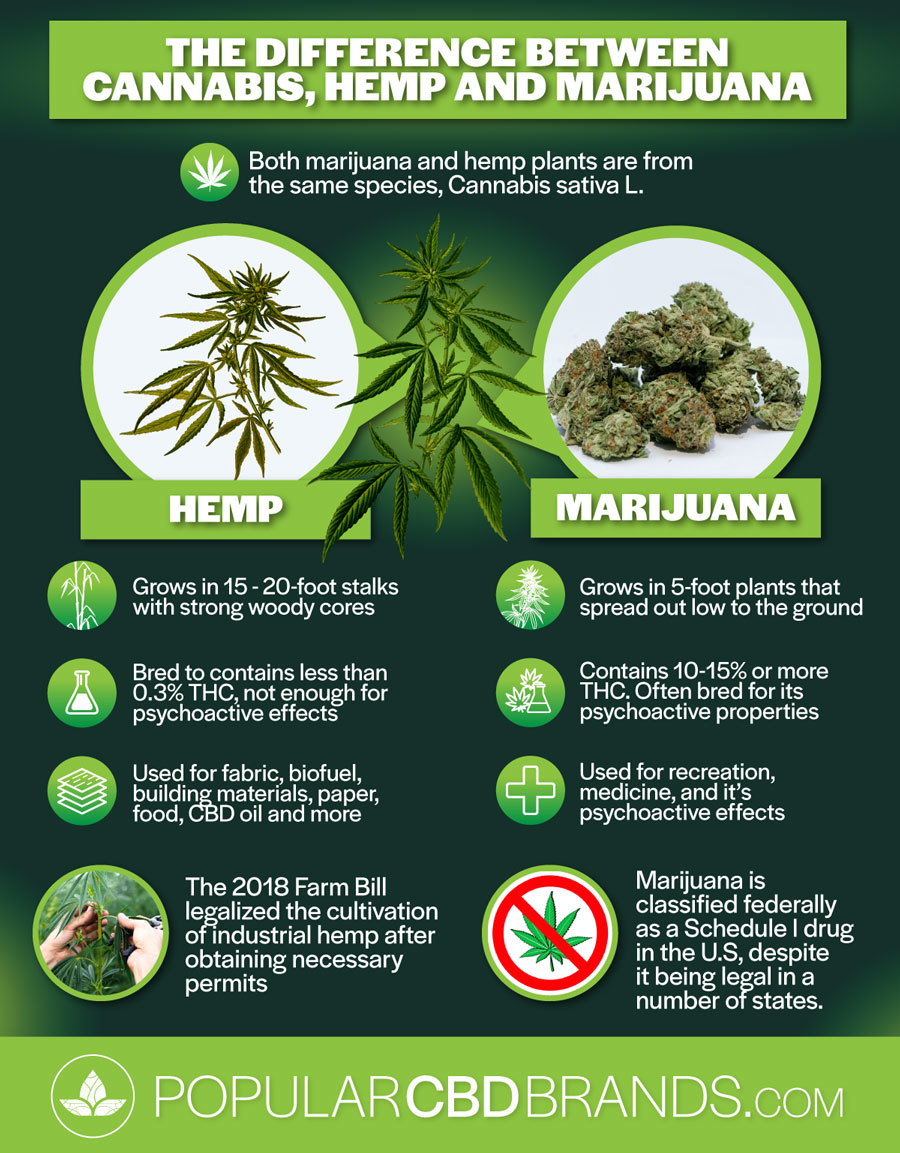
Pharmacology of CBD Oil
The cannabis plant is one that seems uniquely useful to humans because it interacts directly with the human endocannabinoid system. That’s the system by which the human body regulates functions such as reward sensations, appetite and certain cognitive functions. Have you ever felt a sense of total-body euphoria after an intense workout? The famous “runner’s high” is the endocannabinoid system at work.
The endocannabinoid system includes cannabinoid receptors, and the body produces endocannabinoids that transmit messages across those receptors. The cannabinoids in cannabis act on those same receptors.
The full extent to which CBD interacts with the body remains the focus of extensive research. One of the reasons why we still have so much to learn about CBD is because the endocannabinoid system is itself a recent discovery. As scientists continue collecting evidence of CBD oil’s many health benefits, we’ll form a more complete understanding of why CBD does what it does.
Chemistry of CBD Oil
An extract made from the aerial parts of the cannabis plant contains as much as 40 percent CBD. In order to obtain CBD from hemp, though, you need to expose the plant material to a solvent. CBD is not water soluble.
CBD Oil Extraction Methods
Supercritical CO2 Extraction
CBD oil has achieved true mainstream popularity. To remain in the industry in the face of increasing competition, CBD oil producers have had no choice but to upgrade their production methods and use the cleanest, safest extraction system available: CO2 extraction.
Supercritical CO2 extraction is the most common extraction method for CBD oil today. In this method, an extraction machine injects pressurized liquid carbon dioxide into a chamber of ground hemp plant material. The CBD oil drips down to a collection vessel, and the machine reclaims the CO2 for later use. CO2 extraction is the same method that companies use to produce the essential oils used for perfumery. The CBD oil resulting from this extraction method contains absolutely no trace solvents.
The machines necessary for CO2 extraction are very costly, but CBD oil producers must acquire the equipment if they want to compete under today’s market conditions. You should avoid buying anything but CO2-extracted CBD oil, and you shouldn’t have to buy it at an inflated price.
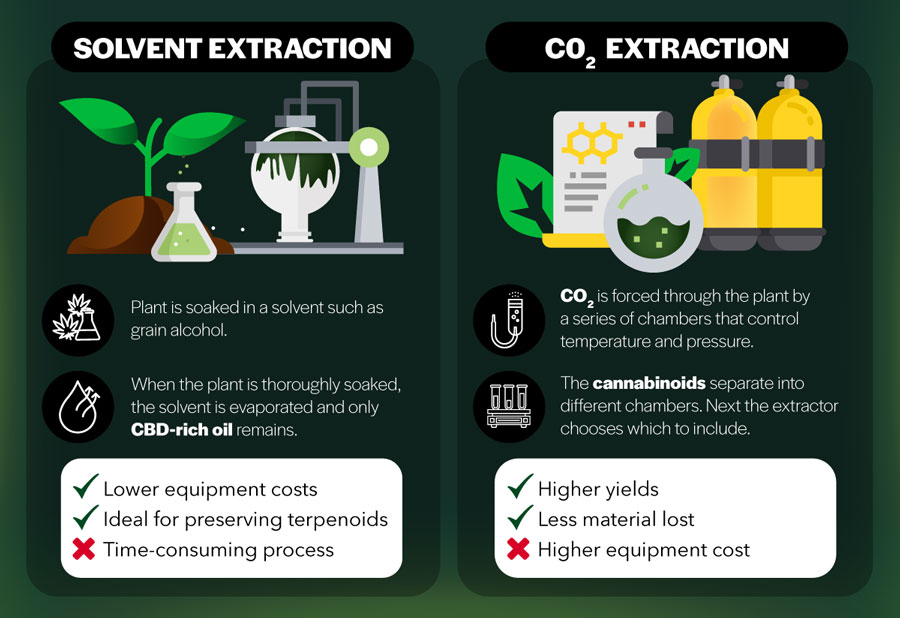
Solvent-Based Extraction
CBD oil first rose to prominence when a man named Rick Simpson told the world that he had applied oil extracted from a CBD-dominant cannabis indica strain topically to rid his arm of cancerous growths. Simpson’s method for extracting CBD oil involved exposing the cannabis plant material to a solvent and boiling away the solvent after extraction. Before long, companies everywhere were using solvents to produce their own “Rick Simpson Oil” or RSO.
The problem with solvent-based CBD extraction is that it’s virtually impossible to extract CBD from hemp with a solvent without any trace of that solvent remaining in the final product. Some of the solvents that can produce CBD oil include methanol, ethanol and hexane.
CBD Oil Types
Full-Spectrum CBD Oil
A full-spectrum CBD oil is a full-plant extract containing all the beneficial compounds of the hemp used to create the extract. A full-spectrum extract contains the CBD from the cannabis as well as its terpenes, which may also have potential benefits. Full-spectrum CBD oil can also potentially have trace THC. Regardless of how much you consume, full-spectrum CBD oil from true industrial hemp will not get you high. However, the trace THC could potentially cause a positive result in a drug test.
Oil From CBD Isolate
To create CBD isolate, a CBD oil producer subjects raw CBD oil to additional filtering and processing until nothing but a white crystalline powder – over 99-percent pure CBD – remains. Since CBD powder is oil soluble, it’s easy to make CBD oil from that powder by simply mixing the powder with a carrier such as MCT coconut oil or hemp seed oil. While the final product will have the same CBD as a full-spectrum CBD oil, it will lack the terpenes of a full-spectrum oil. However, CBD oil from CBD isolate should contain absolutely no THC.
History of CBD Oil
Discovery of CBD
CBD was first discovered and isolated from full-spectrum cannabis oil by Roger Adams, Madison Hunt and J. H. Clark. They worked in collaboration with the federal government and Cornell University. The researchers used methanol to extract the oil from the hashish of wild cannabis indica plants found growing in Minnesota. Mixing the oil with ammonia yielded a pure white powder that the researchers named cannabidiol. The researchers quickly noticed that the CBD powder didn’t affect the body in the same way that full-spectrum cannabis oil would. They published their findings in 1940. CBD was the first cannabinoid successfully isolated from cannabis.
Dr. Raphael Mechoulam
Due to legal restrictions on the growth, distribution and possession of cannabis, research into its properties was slow for many years. Many doctors simply didn’t want to deal with the stigma of working with “illegal drugs.” Some doctors, however, persevered. Most notably, Israeli-born Dr. Raphael Mechoulam spearheaded the research that led to a deeper understanding of the differences between THC and CBD in the 1960s.
In 1978, Dr. Mechoulam published the results of an experiment generally regarded as the first major discovery in the field of CBD-based medicine. Dr. Mechoulam sought to evaluate the potential of CBD as a treatment for epilepsy. He administered CBD to eight epileptic patients for a period of four weeks. All patients reported fewer seizures. Half of the patients stopped having seizures entirely.
Although his discoveries didn’t receive the publicity they deserved at the time, Dr. Mechoulam lived long enough to enjoy the breakthroughs to which his research ultimately led. He is 88 at the time of writing.
Popularization and Continued Research
Research into the benefits of cannabis continued throughout the 1980s and 1990s. It wasn’t until 1996, though, that researchers were really able to kick their efforts into high gear. In that year, California became the first state to legalize medical marijuana. Researchers initially focused on the potential benefits of THC. However, stories such as those of Rick Simpson and Charlotte Figi – a girl whose severe seizure disorder was helped by CBD – brought CBD oil to the forefront of people’s minds.
Today, there is an extensive body of clinical evidence proving that CBD is an effective medication for certain types of seizure disorders. In addition, researchers have found that CBD may hold promise as a treatment for a variety of other conditions ranging from anxiety to inflammation. We’ll discuss that research next.
Medical Uses for CBD Oil
As CBD is an herbal product and not an FDA-approved medication, we cannot claim that it’s intended to diagnose, treat, cure or prevent any medical condition. We also cannot call it a health supplement. We can, however, cite some of the important medical research that’s taken place – and the body of evidence proving the value of CBD has grown quite large.
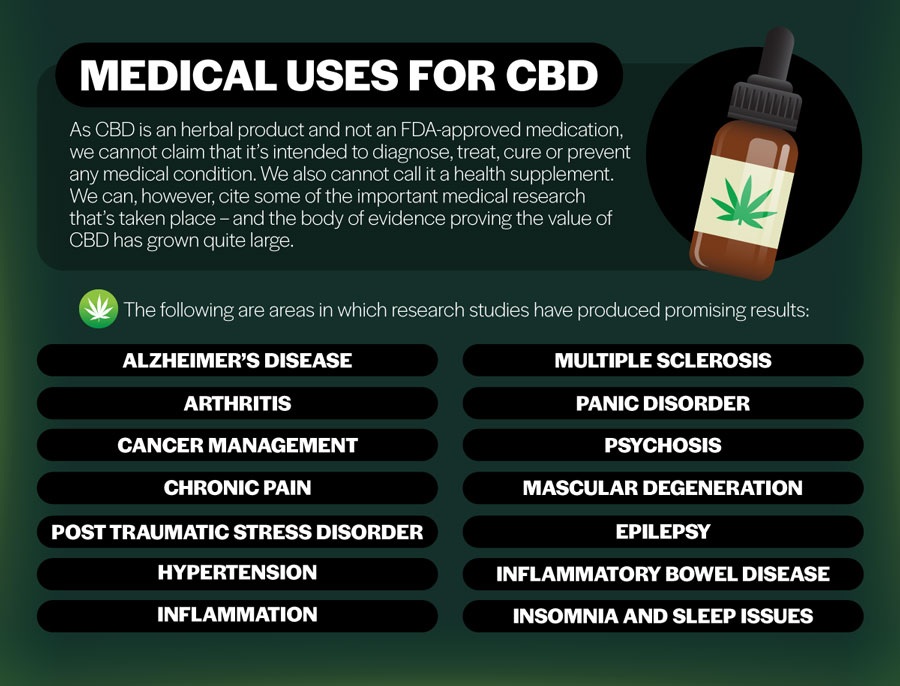
Alzheimer’s and General Cognitive Decline
A 2006 study published in the Journal of Molecular Medicine suggests that oxidative stress is one of the leading causes of Alzheimer’s disease. The clinicians conducting the study examined the potential effects of CBD on Alzheimer’s-related cognitive decline and found that CBD reduces the classic molecular hallmarks of the disease.
Arthritis
CBD appears to be a potent anti-inflammatory compound, and in 2015, researchers examined the effect that CBD may have on patients with arthritis. The European Journal of Pain published the result. In the study, researchers induced arthritis in the knee joints of rats and applied CBD gel as a treatment. The researchers found that topical CBD treatment reduced joint swelling and arthritic pain.
Cancer
In 2015, the Journal of Neuroimmune Pharmacology published a study examining the potential role that cannabinoids could play in cancer treatment. The study noted that, in animal studies, CBD has demonstrated anti-tumor activity when used to treat cancers of the colon, prostate, breasts and more. The study concluded that CBD could enhance the performance of traditional anti-cancer medications.
Chronic Pain and Inflammation
Out of all the health conditions that exist, chronic pain is among the most common and most debilitating. About 38 million U.S. adults deal with pain on a daily basis. Most prescription medications do a poor job of treating that pain. They also have undesirable side effects such as addiction.
In 2008, Therapeutics and Clinical Risk Management published a review of existing studies of cannabinoids and pain management. The studies examined seemed to indicate that THC is a better pain fighter if CBD is also present. The finding seems to confirm that CBD is a powerful anti-inflammatory compound on its own.
Epilepsy
As mentioned above, research into the effect of CBD on seizure disorders dates back to the 1970s. Research in that area has continued to the present day. A study published in Seizure in 2012 asserted that CBD reduces the severity and frequency of some types of seizures. The study also found that CBD can reduce seizure-related mortality. In 2018, the FDA approved the CBD-based prescription drug Epidiolex for the treatment of Dravet syndrome and Lennox-Gastaut syndrome. The approval of Epidiolex represents a major breakthrough in the acceptance of CBD as a real medicine.
Hypertension
In 2017, JCI Insight published the results of a double-blind study in which nine healthy men were given either a placebo or 600 mg of CBD. The researchers who conducted the study found that CBD lowered both resting and post-exertion blood pressure.
Inflammatory Bowel Disease
In 2008, the British Journal of Pharmacology published a study in which the effect of CBD on mice with inflammatory diarrhea was examined. The researchers induced bowel inflammation by administering croton oil to the mice. The mice then experienced diarrhea. The researchers found that administering CBD to the mice with inflamed bowels normalized their bowel movements. CBD had no effect on mice with normal bowel movements.
Insomnia and Sleep Regulation
The treatment of sleep disorders is an area in which the isolation of CBD from cannabis may have profound benefits. While there appears to be a link between THC and poor sleep quality, CBD seems to have the opposite effect. Current Psychiatry Reports published a review of multiple sleep-related cannabis studies in 2017. According to the review, CBD may help to regulate REM sleep and combat drowsiness during the day.
Macular Degeneration From Diabetes
Retinal cell death from diabetes is a serious problem that has caused blindness in about 16 million Americans. A way to prevent blindness from occurring would be a godsend for anyone suffering from diabetes. In 2006, the American Journal of Pathology published the results of a study in which diabetic rats were treated with CBD. Researchers found that CBD treatment reduced oxidative stress and prevented retinal cell death.
Multiple Sclerosis
In 2018, Frontiers in Neurology published a review of literature documenting the use of cannabis in patients with multiple sclerosis. The review concluded that CBD can improve the quality of life in those with the disorder by eliminating fatigue, pain, depression, inflammation and spasticity.
Panic Disorder
Worldwide, hundreds of millions of people suffer from panic disorder. While prescription medications for anxiety exist, many cause dependency and have other negative side effects. In 2017, Current Neuropharmacology published a review of human and animal studies evaluating CBD’s potential as a treatment for anxiety and panic. The researchers concluded that CBD appears to have a clear anxiolytic effect.
Post-Traumatic Stress Disorder
At the beginning of the article, we discussed the discovery and role of the body’s endocannabinoid system. Scientists have found that the endocannabinoid system plays a role in the conditioned fear response resulting from the memory of a traumatic event. In 2017, Neuropharmacology published the result of a study on post-trauma fear response in rats. In the study, researchers discovered that, if administered immediately after a traumatic event, CBD appears to disrupt the activities of the endocannabinoid system and prevent a long-term fear association from developing. CBD could therefore potentially play a role in the treatment of post-traumatic stress disorder.
Psychosis
In 2012, Current Pharmaceutical Design published a review of multiple studies evaluating the effect of CBD on psychotic disorders. The clinicians conducting the review found that CBD has a pharmacological profile similar to that of antipsychotic drugs without the side effects that those drugs exhibit. It is therefore possible that CBD could play a role in the treatment of disorders such as schizophrenia.
Health Benefits of CBD Oil Terpenes
One major benefit of using a full-spectrum CBD oil is that the oil will include the terpenes from the cannabis plant in addition to the CBD content. Terpenes are organic compounds found in many different plants, and hemp is rich in them. Like CBD itself, scientists are only just beginning to understand the ways in which terpenes can benefit health.
Research suggests that terpenes may provide many benefits of their own in addition to enhancing the properties of CBD. Some CBD oil makers provide lab reports detailing the terpene profiles of their products. Other makers add specifically selected terpene blends to their CBD oils. These are some of the terpenes that a full-spectrum CBD oil may contain.
Borneol
Borneol has the scent of camphor. It has antimicrobial properties. It’s used in some balms and lotions to provide relief from muscle and joint pains.
Caryophyllene
Caryophyllene smells like a mix of turpentine and cloves. It has anti-inflammatory properties.
Eucalyptol
Being a major component the plant, eucalyptol smells like eucalyptus. It is antimicrobial. It also repels insects. It suppresses coughs and is a bronchodilator. Researchers have studied its potential uses in the treatment of colds and lung disease.
Humulene
Humulene smells like hops. It’s also reminiscent of beer. Researchers have discovered that it may have anti-tumor properties.
Limonene
Limonene has the scent of lemon peels. It fights bacteria and fungus. It may also help to reduce inflammation.
Linalool
Linalool has a floral scent like lavender. It is antimicrobial. When used in aromatherapy, linalool seems to reduce anxiety and depression.
Myrcene
Myrcene smells a bit like allspice. It has sedative properties. It also fights inflammation and pain.
Nerolidol
Nerolidol has a bright floral scent. It is a powerful antimicrobial agent, and it may also fight parasitic infections.
Ocimene
Ocimene smells sweet and floral with a touch of woodiness. It is an insect repellant. It also has anti-inflammatory properties. Ocimene has also been studied for its potential to improve health in diabetics.
Terpinolene
Terpinolene smells like a mix of pine and citrus. In addition to its anti-pest and antimicrobial effects, terpinolene seems to have sedative properties.
Pinene
As the name implies, pinene smells like pine trees. It fights inflammation and increases alertness.
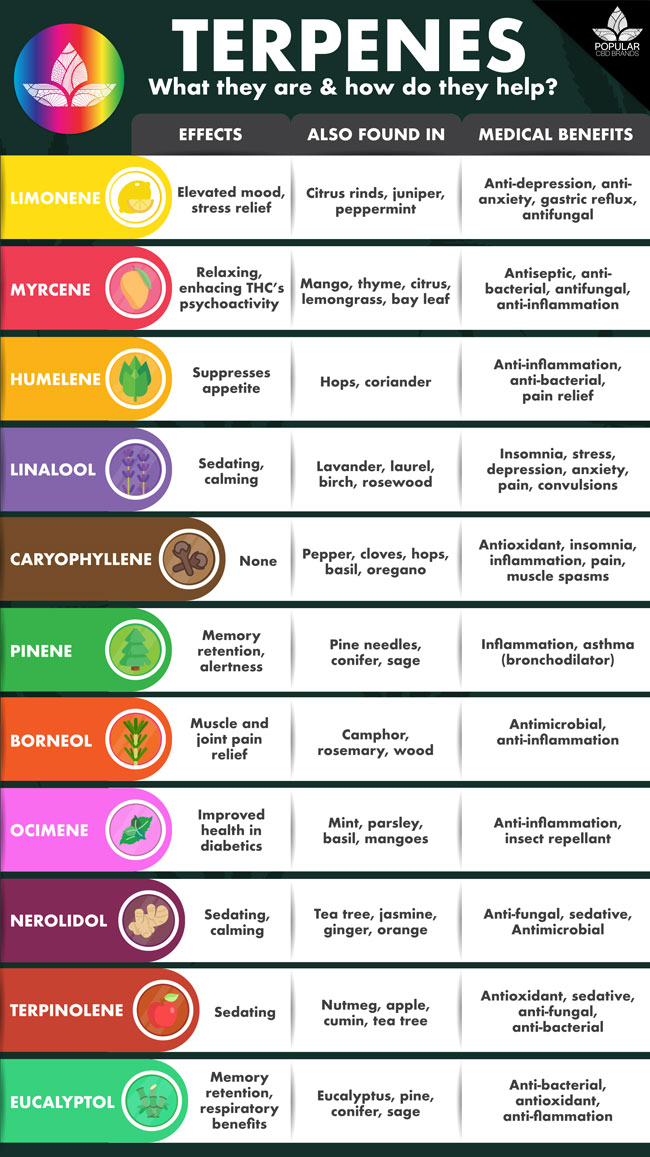
CBD Oil Industry
The CBD oil industry grows by leaps and bounds each year. Some predict that the total size of the CBD market will exceed $22 billion within the next few years. Since demand for CBD is showing no signs of slowing, new companies enter the industry seemingly every day. These are some of the key stakeholders in the growing CBD oil industry.
Hemp Growers
Today’s farmers are accustomed to earning around $1 per pound for crops such as corn or kale. For them, CBD-rich hemp – with a price around $35-40 per pound – has proven a godsend. Buyers can’t get enough of it, and farmers are scrambling to devote more of their fields to the crop. Large-scale industrial hemp farmers can potentially earn tens of millions of dollars for their crops each year.
Some farmers, however, have found that earning money from growing industrial hemp for CBD isn’t as easy as it sounds. If a crop doesn’t have a high CBD yield, buyers won’t want it. Meanwhile, federal regulations specify that, after drying, industrial hemp must contain no more than 0.3 percent THC. Seeds guaranteed to grow into plants meeting those parameters cost up to $2 each.
An additional challenge of growing industrial hemp as a cash crop is that mechanization hasn’t revolutionized hemp farming in the way that it has crops such as corn and wheat. Growing hemp requires extensive manual labor, and some farmers aren’t prepared for the expense of taking on additional workers.
CBD Oil Producers
Some CBD oil brands produce their own products in house. Others, however, buy white-label CBD products. White-label CBD oil producers specialize in bulk processing of cannabis and sell only to other businesses. The equipment necessary to extract CBD from large amounts of hemp is prohibitively expensive. Working with a bulk cannabis processor lowers the cost of entry for a new company that wants to enter the CBD industry.
Companies that specialize in bulk CBD extraction can extract CBD oil quickly and efficiently. Thanks to their equipment, they can process mountains of plant material at a time. CBD oil producers can often customize batches to meet the needs of their clients. They’ll process only specific strains of hemp, or they’ll enrich the oil with custom terpene blends. Those customizations result in products that are completely unique. Such companies often also have the capacity to produce other types of CBD products. We’ll discuss some other common CBD products next.
Other CBD Products
CBD oil is the most important CBD product. It tends to have the lowest cost per mg of CBD. It is also the CBD product that’s closest to the original hemp plant in terms of the amount of processing involved. By isolating pure CBD powder from raw CBD oil, though, a company can add a dose of CBD to almost anything.
CBD candies and capsules are available for those who dislike the taste of CBD oil. Lotions, balms and subdermal patches are available for those who want to apply CBD topically. You can find CBD-infused beauty products, baked goods, coffees and just about everything else you can imagine.
CBD Importers and Exporters
Though domestic farmers are working hard to increase the land that they devote to industrial hemp, the increased yields are not yet enough to satisfy demand. That’s likely to remain the case as long as demand for CBD continues to grow. In the meantime, companies in the CBD oil industry can make up their supply chain shortfalls by importing CBD oil or CBD isolate from overseas producers.
China has become the world’s largest producer of industrial hemp, and Chinese wholesalers are happy to ship raw CBD oil – or pure CBD isolate – anywhere in the world. Many of those wholesalers even have the ability to ship products in retail packaging with custom labels.
The ability to import finished CBD products from China has further lowered the barrier of entry for new companies looking to get into the CBD industry. Domestically, a few companies have taken advantage of that situation by operating as brokers. Domestic CBD brokers handle communication with overseas CBD oil producers and manage shipping logistics.
CBD Oil Legality in the United States
As you likely know, the legality of industrial hemp is an incredibly confusing topic. If you’re looking for a short answer, CBD oil containing less than 0.3 percent THC is federally legal. In late 2018, President Donald Trump signed the Hemp Farming Act of 2018 into law. The act removed industrial hemp from the federal government’s list of controlled substances and paved the way for American farmers in all 50 states to acquire the necessary permits to grow the crop.
CBD Oil in Green States
In states that allow the medicinal or recreational use of marijuana, CBD oil doesn’t necessarily have to come from industrial hemp. If you live in a green state, you may find CBD oil products in your local dispensaries that are made from high-CBD marijuana rather than hemp. Such a product would have THC content higher than the federally mandated limit and may not be legal to transport across state lines.
Potential FDA Regulation of CBD Oil
On April 2, 2019, outgoing FDA commissioner Scott Gottlieb issued a statement explaining that the FDA intended to explore potential regulatory pathways for CBD products. In his statement, Gottlieb stated that CBD was a topic of major concern to the agency because the CBD-based drug Epidiolex has undergone extensive testing and has received FDA approval. Gottlieb also expressed concern about what the agency felt were unsubstantiated health claims made by several companies about CBD. Though the CBD industry continues to grow rapidly, it seems likely that the FDA will find a way to introduce some level of regulation in the future.
How to Buy the Best CBD Oil
As you’ve likely surmised from reading this article, it is definitely not safe to assume that two different bottles of CBD oil contain essentially the same product. From the raw hemp to the extraction method and post-processing, a change in one aspect of the CBD oil production process can make a significant difference in the final product. No single CBD oil is the best product for every person and every need. However, these simple guidelines can help you determine your priorities and select the ideal CBD oil for your purposes.
Hemp Growing Conditions
As we described above, the supply of industrial hemp originating from overseas producers is far more plentiful than the domestic supply. When you consider the ramifications of ingesting a concentrated plant extract, does the possibility of that extract originating from another country concern you? What if that country is lax in its enforcement of regulations regarding activities like pesticide usage? It’s probably worthwhile to pay a little more for CBD oil extracted from domestic hemp grown according to organic practices.
CBD Oil Extraction Type
Although large white-label producers have made CO2-extracted CBD oil accessible to even the smallest CBD brands, solvent-based extraction still exists because it’s fast and cheap. On major import/export marketplaces like Alibaba, you can find the sources from which many domestic CBD oil brands are obtaining their products. Virtually all of the sellers on Alibaba claim to be using CO2 extraction – but there’s no way to prove the truthfulness of those claims without actually visiting the producers in China.
Do you think that a low-budget American CBD oil seller is actually traveling to China to study every aspect of the production process? It’s not likely. If a domestic CBD oil seller sources its products from overseas, there’s no shame in that. The company should reassure its customers by describing the steps it takes to ensure adherence to the best practices in every aspect of production. If a company produces its CBD oil domestically, though, that’s even better.
Full-Spectrum CBD Oil vs. CBD Isolate
We described the differences between full-spectrum CBD and CBD isolate earlier in this article. Before you buy any CBD oil, you should know which type you’re getting. It’s also worthwhile to know whether the producer has enriched the product with additional terpenes.
Third-Party Testing
Hemp can pick up heavy metals from the soil in which it is grown, and those heavy metals can end up in the CBD oil drawn from the plant. There’s also a possibility that a bottle of CBD oil could contain trace pesticides or solvents. In addition, consumer watchdogs have stated that some bottles of CBD oil are mislabeled and do not actually contain the amount of CBD claimed. CBD oil is expensive. Before you spend your hard-earned money, you should know exactly what’s in the bottle. It’s wise to choose a CBD oil producer that routinely submits its products to a third-party laboratory for analysis and publishes the test results.
Latest posts by nijasob538 (see all)
- Slot777: Serunya Main Slot Gacor 777 yang Bikin Nagih! - July 20, 2025
- Spaceman: Menjelajahi Dunia Slot Penuh Petualangan di Antariksa - July 4, 2025
- Казино Клубника играть бесплатно - May 18, 2025
